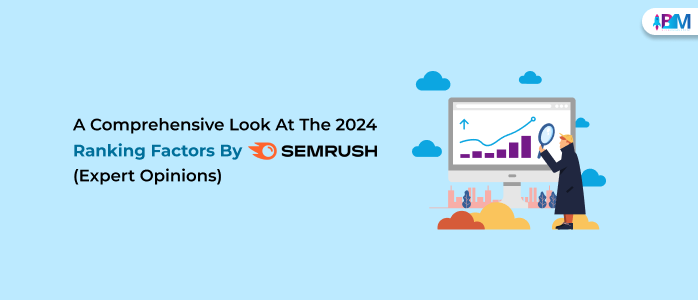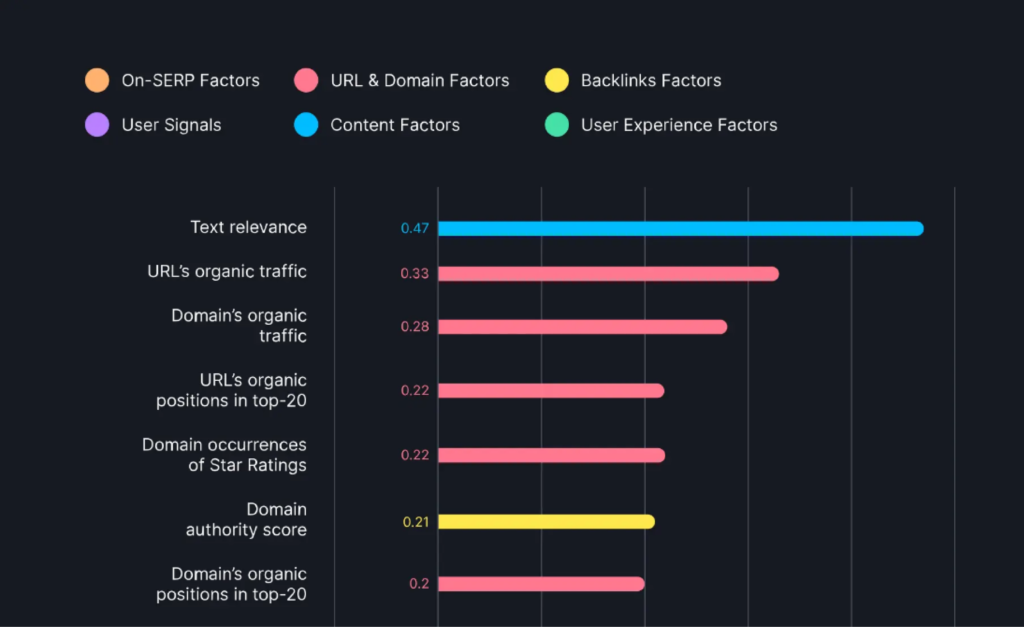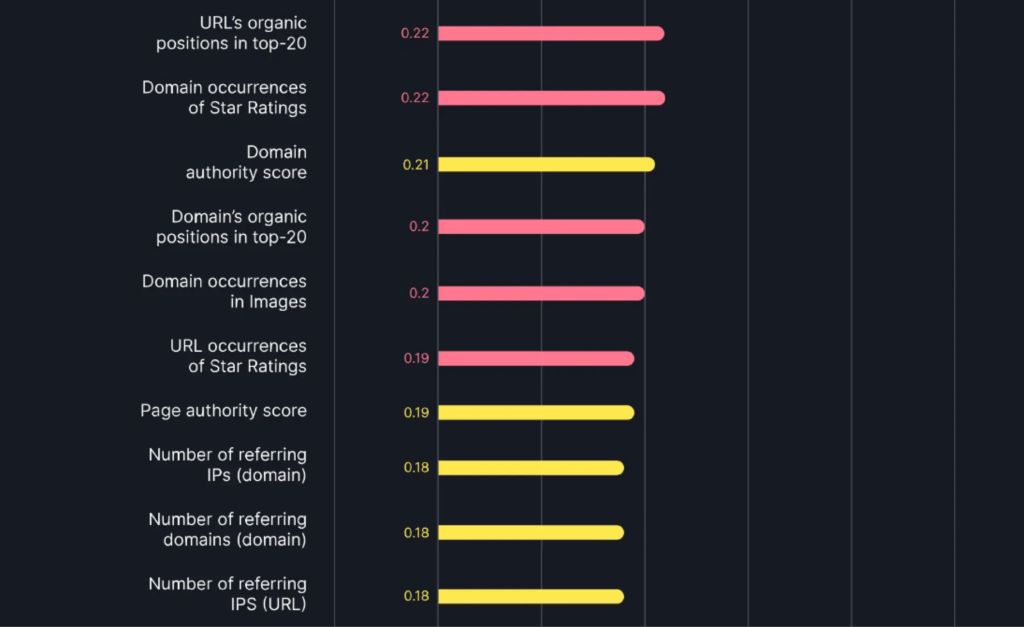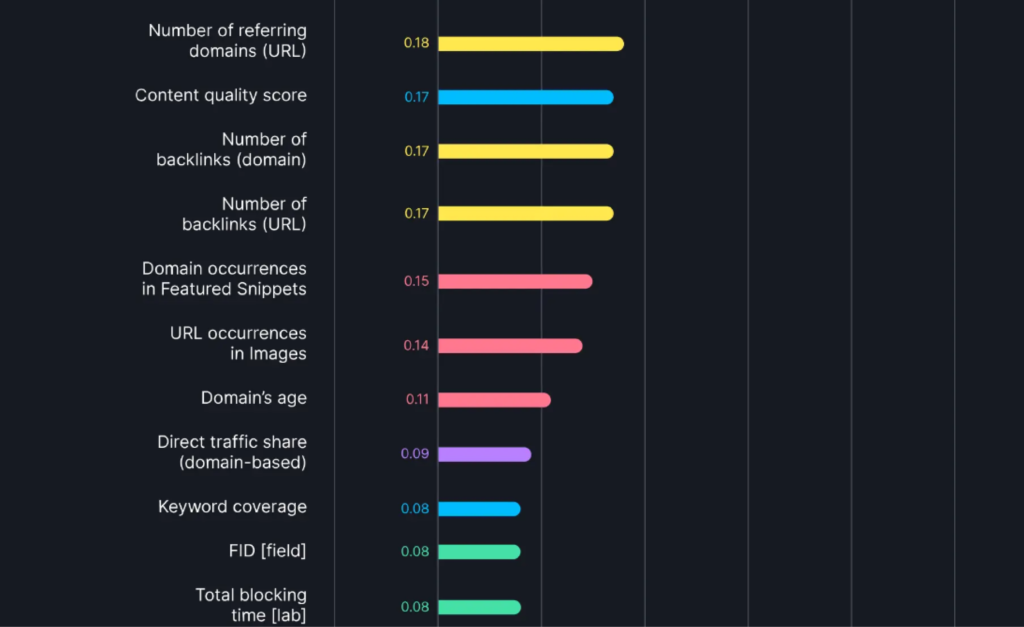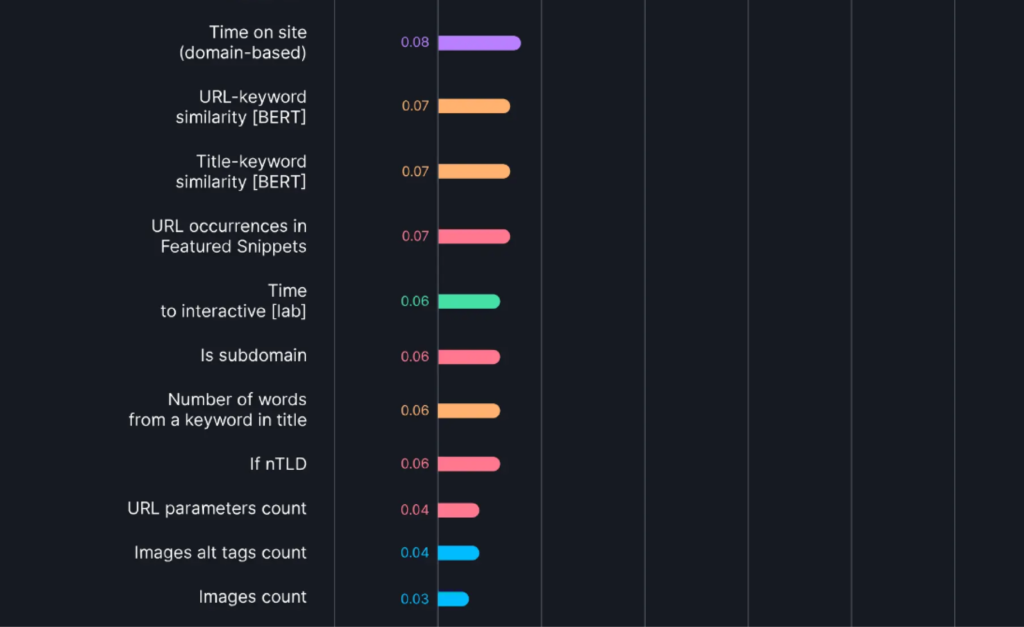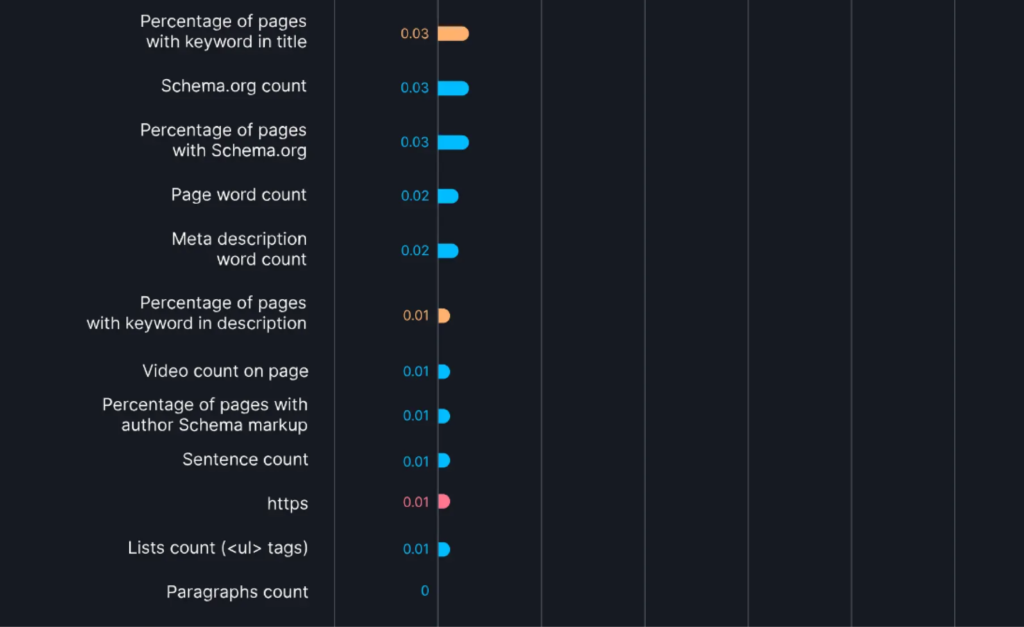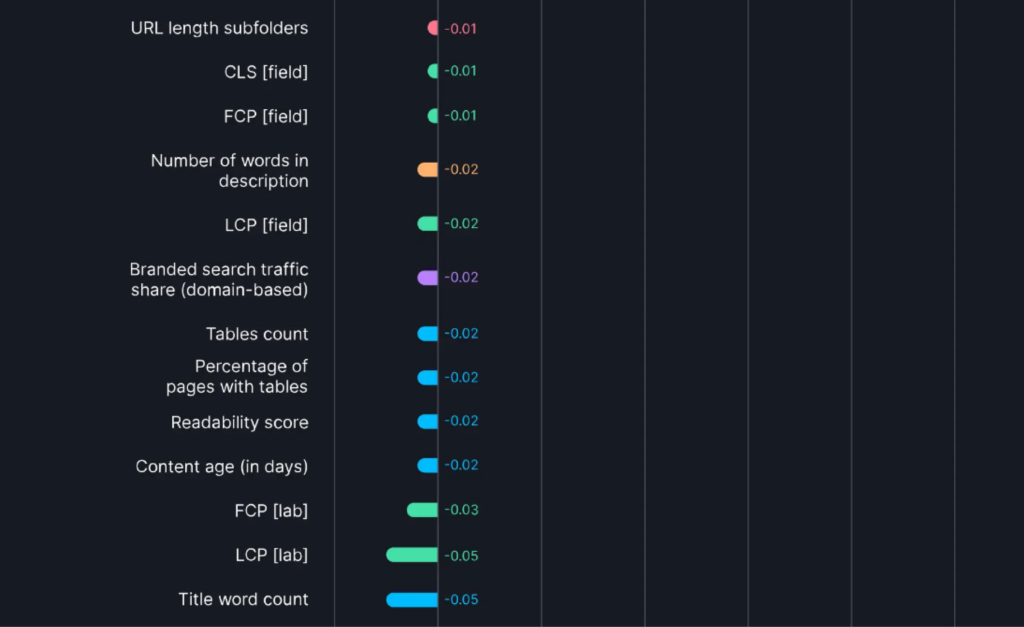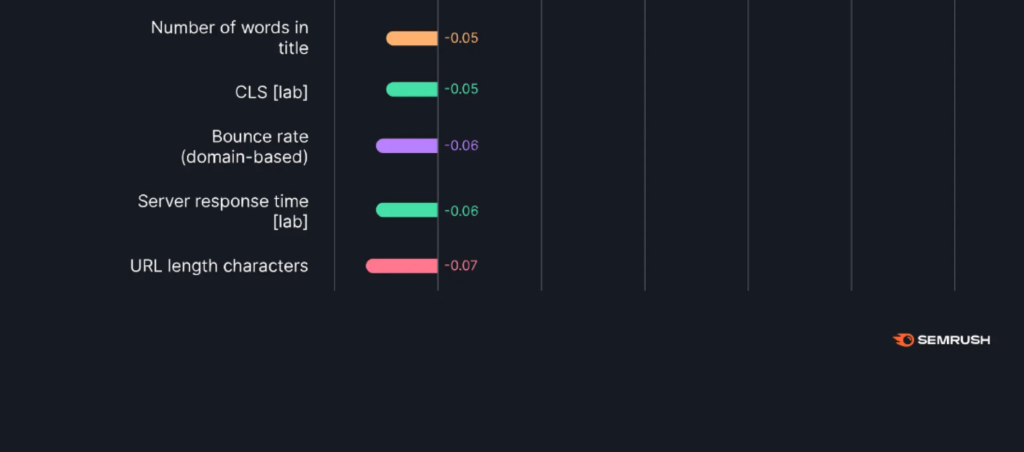Recently, SEMrush published its study on Google Ranking Factors for 2024.
Are these findings going to change the way you approach SEO?
YES or NO?
What should be your SEO strategy for 2024?
Hold On…We Will Address All Your Doubts, One By One:
- The complete study.
- Highlights of the Study.
- What top SEO experts have said about this study.
- The surprising factors.
- And finally, our verdict.
Well, Let’s Start by Understanding The Study By Semrush
First, the sample size?
After analyzing 300,000 search results and 16k keywords and focusing on the following factors…
- Content Metrics.
- Backlink Factors.
- On-SERP Factors.
- User Signals.
- URLs and Domains.
- User Experience.
…they curated this study.
Reference: https://bit.ly/3HGakZb
Next? The Key Findings…
According to the study, these factors get the front-row seat:
1. Content And Relevance
With a correlation of 0.47, text relevance was the dominant factor of this study.
What is text relevance? It is the matching of the intent of the keyword with your page.
Afterward, content quality was at 0.17, and keyword coverage was at 0.08.
We think the key is creating content as if you are the reader. What kind of results make you happy when you are searching for something? You want the complete information that matches your search query, right?
So, create content in a similar fashion. Not something that is heavily focused on keywords.
And focus on crafting helpful content (of course, E-E-A-T optimized) to stay above the curve.
2. URL And Domain Factors
For the URL’s organic traffic, there is a correlation of 0.33; for the domain’s organic traffic, it is 0.28.
It’s interesting to note that occurrences of domains in image search results contribute to this correlation, while long URLs (-0.07 correlation) are always considered bad by search engines.
3. Backlink Factors
Oh, as expected…backlinks played a pivotal role.
Because the report says, Domain Authority (DA) has a correlation of 0.21.
Page authority and several referring domains stand next with a correlation of 0.19 and 0.18.
4. Factors Affecting User Experience
Surprisingly, the top factor in the user interface is the First Input Delay (FID), with a correlation of 0.08.
Additionally, server response time has a correlation of -0.06. (which makes sense, right?).
Now, Let’s Explore What Experts Think About This Study
Okay, let’s start with someone who is the voice of SEMrush.
Yes!
SEMrush’s head of branding, Erika Varangouli, has segregated all these factors in her recent LinkedIn post.
Basically, She Has Segregated The Study Into The Key Findings:
𝟙. Content Relevance Came At The Top Of All 60+ Ranking Factors: Meaning Google is surfacing content that does a better job of answering the main user intent and relevant subtopics.
𝟚. Reputation And Customer Experience Matter: We found a strong correlation between the number of star ratings in a domain’s pages’ organic listings and rankings.
𝟛. Domain & Page Authority Score: This may not be a metric Google uses, but the correlation is there. To me, this shows that these metrics are still good metrics to monitor to gauge whether you’re headed in the right direction or not.
𝟜. Content Quality Matters: We built a “content quality” metric which allowed us to measure the quality of the content in the SERPs. Content with a higher score performed better than content with a lower score.
𝟝. Comprehensive Content Matters Too: We found that a URL’s organic position in the top 20 was strongly correlated with higher rankings. Pages ranking at the top for one keyword tended to rank for as much as 4x more terms than pages in position 20.
Let’s Move On To Another Expert, Nathan Gotch!
He is quite popular among SEOs, especially for his unique perspective on SEO.
Here Is The Recent Video:
In the above video, he discussed the factors shared by SEMrush and segregated them into 5 categories:
🔥The MOST IMPORTANT factor, according to Nathan Gotch (time stamp 17:40):
As per his analysis, overall domain authority (or the strength of the domain) caused by high-quality backlinks is the winner.
✅Then, Factors He AGREES To
- Text Relevance.
- Content Relevance.
- Page authority score.
- #Referring IPs.
- Content quality score.
- Keyword coverage.
- Keyword placement.
❌And The Factors He Does NOT Agree
- URL & Domain traffic positions.
- Ranking in images.
- Ranking in feature snippet.
⬛Finally, The Factors He Is NEUTRAL About
- Word count.
- Content age.
- Start rating/scheme.
- Domain name.
- Direct traffic.
- Page score.
- Loading speed.
- Dwell time.
Missing factors❓
- Search intent.
- Topic authority.
- Link quality & relevance.
- Anchor text.
JR Oaks, a renowned SEO expert, has pointed out some of the report’s shortcomings. In his words:
So, what does that even mean? Takeaways from JP Oaks remarks:
1. Novel Metrics Missed
Specifically mentioned a lack of consideration for passage indexing when comparing SERP page embeddings to content embeddings.
2. BERT Model Information Missing
The study lacks details on the type and size of the BERT model used as a crucial aspect for transparency and understanding the methodology.
3. Experience Metrics Shortcomings
Suggests the inclusion of additional factors like frameworks, console errors, user notifications, and ad usage for a more robust evaluation.
4. Call For Human Grading
Proposes the idea of hiring graders to manually review and score pages, emphasizing the potential for a more insightful analysis.
5. Enhanced Scope For Experience Metrics
Recommends including elements like frameworks, console errors, user notifications, and ad usage for a more thorough assessment.
6. Unrealized Potential
He believes that with the suggested enhancements, the study could have achieved a higher level of insight and impact.
Now that you know what the experts think of the study, let’s see what we found surprising.
What Surprised Us?
Yes, we were taken aback to find that some of the best practices were considered as no impact factors.
🤔Title Word Count
It’s best to keep titles under 60 characters. Right?
Because long headlines get cut off in search results, resulting in a diminishing CTR.
But it’s surprising that this report says it has a negative correlation.

🤔Next, Page Speed
As per the study, there is no correlation between higher rankings and page speed.
This is very shocking as slower pages lead to poor user experience.
🤔Readability Score
Usually, a higher readability score leads to optimum user experience, right?
However, the research indicates otherwise.
Most pages holding top positions sport a readability score of 48.5, dipping below the average score of 51.2.

Our Verdict – Roadmap For SEOs in 2024
We know there are many factors that contribute to search rankings. However, we prioritize these four parameters over anything else:
- Address search intent properly (people-first content).
- Write in compliance with E-E-A-T.
- Curate comprehensive Content for Broad Rankings.
- Build high-quality niches and relevant backlinks from authority sites.
Remember, the SEO landscape has changed.
SEO is now building your brand. So, start building an audience, a community (readership).
So, how to build your brand with SEO in 2024? How long it will take to build a loyal readership?
